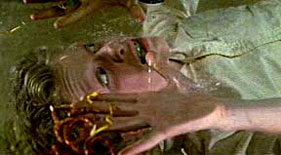
Hollywood operates on one basic premise: wait for the new thing, and rip it off incessantly as long as possible. What begins in all novelty and ingenuity quickly becomes watered down and fragmented to the point where everything is an unavoidable cliché. The rare films that break new ground are bound to hit hard, and they're bound to be lathered, rinsed, and repeated ad infinitum. Consider the plight of John Hughes. Though he's acknowledged (mostly by my generation) as the patron saint of teen comedies, he has been unfairly disallowed the status of cinematic innovator. Granted, his chosen genre does not command the type of respect critics reserve for a Cassavetes, or an Altman, or a Scorcese, yet his influence on Hollywood is profound and probably eternal. I would go as far as saying that every single teen comedy to come out since the release of Sixteen Candles owes him a debt of influence. Yet I can think of few that even to a small extent capture the essence of his original movies (Can't Hardly Wait is the only one that comes really close). Here's an unexpected fact: Hughes only directed eight films. Here they are: Sixteen Candles, The Breakfast Club, Weird Science, Ferris Bueller's Day Off, Some Kind of Wonderful, Planes, Trains, & Automobiles, She's Having a Baby, and Curly Sue. Curly Sue aside (for that is undeniably a complete piece of shit), that's a pretty fucking good track record. Of course, as a writer, he was much more erratic, his scripts ranging from the sublime (Pretty in Pink, Home Alone) to the horrendous (Flubber, Beethoven). What happened here? Why did the guy responsible for, depending on whom you ask, four to six classics in a row come to be the go-to guy for kiddie bullshit? And why did he cease to direct anything? Whatever the case, it all began with Sixteen Candles, which actually remains as funny and sweet as it ever was. Though the VH1 quipster crowd is all too quick to get all "John Hughes RULES," in this case I fight my contrarian instincts to acknowledge the truth: this movie RULES. It's laugh-out-loud funny almost throughout, and ends with what is probably the most completely heart-melting romantic ending of any movie from the 80s, including Die Hard, in which Bruce Willis and Reginald VelJohnson exchange vows atop the burning building.
What the many Hughes-inspired movies miss, and what makes Sixteen Candles, especially, hold up so well, is the goofy mix of teen angst and visual slapstick. The comedy is rich, but the characters are real. The period trappings that should date the film most embarrassingly (clothing, hairstyles, bedroom-wall posters of bands) are completely organic to the characters—you never get the sense of "teensploitation," or clueless studio executives infecting the details with their idea of what teenagers are all about. And Hughes has such obvious compassion for and identification with the teens in his stories that what you end up focusing on is the yearning for connection, not the feathered hair. Though many movies in the 90s and 00s have tried to arrive at Hughes's inimitible alchemy, they invariably get lost in trying too hard to make a "John Hughes movie," and the difference is, you can't do it from the outside in. Hughes always led with his heart and let the humor arise naturally. Sixteen Candles is pure fantasy, of course, but it's so true, even now, that it remains marvelous catharsis for all the ways in which your own high school experience didn't work out. How many Samanthas out there didn't ever get their Jake Ryan? How many Farmer Teds out there never took the risk of going to that senior party? The movie celebrates "going for it," something we all need to do more, and something that is hardest to do under high school rule. I still try to live like Farmer Ted, and I'm 93 years old!
Of course there is a lot to enjoy in the periphery of Sixteen Candles, too. Spotting future stars (John Cusack, Jami Gertz) on the sidelines is great fun, and the soundtrack (Specials, Oingo Boingo, Thompson Twins, and, of course, the Temple City Kazoo Orchestra) is still way hipper than you. The performances all around are perfectly pitched—Anthony Michael Hall is outrageously funny, Molly Ringwald is the Clara Bow of self-doubt, Gedde Watanabe is off the hook as Long Duk Dong … and right on down to tactless, chortling Grandpa Fred (Max Showalter) and geek paradigms Bryce and Cliff (John Cusack and Darren Harris)—everyone is completely on the mark. (My favorite moment: Cusack removing his headband-flashlight and putting it in his pocket still on, so you see it shining through his coat.) The humor is crude, but compared with the movies that followed in its footsteps, Sixteen Candles is infinitely more good-natured, and the script, line-for-line, is more quotable than about any film I can think of. What I admire most about the film, though, is that it ushered in a new cinematic genre, rooted in the wacky teen comedies of the 60s as well as Buster Keaton and National Lampoon, but ultimately synthesizing into something totally new. The influence of this movie can't be understated, and it's unfair to deny Hughes the "genius auteur" tag just because he wasn't trying to be all that serious. Sixteen Candles is a bona fide classic—and a fuckload funnier than Jack Lemmon and Tony Curtis in drag, for that matter.
Review by |

